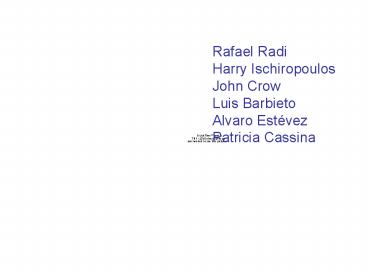Rafael Radi - PowerPoint PPT Presentation
1 / 34
Title: Rafael Radi
1
Rafael Radi Harry Ischiropoulos John Crow Luis
Barbieto Alvaro Estévez Patricia Cassina
2
The Linus Pauling Institute andEnvironmental
Health Sciences CenterOregon State University
3
O2--gtO2.-
Cu,Zn SOD
Arg--gtNO--gtcGMP
H2O2 -gt HO.
Measure with aminotriazole/catalase J Appl
Physiol. 198763 353-8
H2O2 ki/kcat
4
(No Transcript)
5
(No Transcript)
6
Superoxide Nitric Oxide Fact or Fiction
1.6 x 1010 M-1s-1
(W. Koppenol)
ONOO- CO2
O2.- .NO
.017 s-1
Virtually every collisionproduces
cis-peroxynitrite Peroxynitrite is kinetically
sluggish in its subsequentreactions, which
makes itmore selective than HO.
7
(No Transcript)
8
(No Transcript)
9
SOD-catalyzedtyrosine nitration
Ischiropoulos et al. Peroxynitrite formation
from macrophage-derived nitric oxide. Arch.
Biochem. Biophys. 298446-451 1992.
10
(No Transcript)
11
Lower motor neurons make muscles to contract.
We have about than500,000 for life
The neuromuscular junction
12
Motor Neurons Degenerating early in ALS in The
Ventral Horn of the Spinal Cord
After 1-3 months
13
(No Transcript)
14
(No Transcript)
15
(No Transcript)
16
SOD in Reverse Making ONOO- from NO and Oxygen
17
Estevez, A.G. Spear, N. Manuel, S.M. Radi, R.
Henderson, C.E. Barbeito, L. Beckman, J.S.
Nitric oxide and superoxide contribute to motor
neuron apoptosis induced by trophic factor
deprivation. J. Neurosci. 18923-931 1998.
18
Effects of SOD on nNOS Expression and
Nitrotyrosine
19
Cu,Zn SOD keeps trophic factor deprived motor
neurons
Zn- SOD induces apoptosis in motor neurons
20
Copper, SOD and ALS
- nNOS knockout not protective
- Mutant SODs still have high affinity for zinc
- Copper chaperone for SOD not protective (but 18
residual activity and can accelerate disease in
some mice -- Beckman et al, FRBM 1993) - Double mutant to copper site still develops ALS
- Quad mutation to copper site still develops
ALS (Binds copper and is redox active)
21
(No Transcript)
22
Cu (61.5)
Cu (61.5)
Apo Quad
Cu (61.5)
23
Aggregation of Zn(-)SOD (DC)
Estimated MW
Cu,Zn SOD31,820
Cu,(-) SOD31,140
Actual MW
Cu,Zn SOD31,856
Cu,(-) SOD31,650
evidence of larger radius
24
Czapski and Goldstein The uniqueness of
superoxide dismutase (SOD) - why cannot most
copper compounds substitute for SOD in vivo?
Free Rad. Res. Comm. 4225-229 1988.
- The rate of Cu1 reoxidation is very slow in
Cu,Zn SOD - The reverse reaction is a billion times
slower,but with high SOD (10 µM) and low fluxes
of superoxide, the concentration of oxygen may
approach a billion times that of superoxide
25
Copper has no role in SOD toxicity in ALS!
Wang et al. (2002) Fibrillar inclusions and
motor neuron degeneration in transgenic mice
expressing superoxide dismutase 1 with a
disrupted copper-binding site. Neurobiol Dis 10,
128-138. Wang et al. (2003) Copper-binding-site-
null SOD1 causes ALS in transgenic mice
aggregates of non-native SOD1 delineate a common
feature. Hum Mol Genet 12, 2753-2764.
But no one asked the protein?
26
Protein Aggregation and SOD
- Aggregation occurs and commonly thought to be
toxic - 8-13 of soluble protein is SOD in the ALS mouse
- Very little evidence of cell death in neurons
overexpressing mutant SOD in cell culture - Large aggregates may be protective
- SOD aggregates in mitochondria
27
Nitrotyrosine Staining in G93A Transgenic Rat
Spinal Cord Root(x 5)
28
Reactive Astrocytes revealed by
GFAPImmunoreactivity in ALS
Symptomatic G93A SOD Transgenic Rat
Nontransgenic littermate
29
Reactive Astrocyte Kill Motor Neuronsby
Secreting Nerve Growth Factor!
- The NGF is secreted in a pro-form
- p75 neurotrophic receptor expressed on the
motor neuron cell surface is required for
toxicity - Nitric oxide is required for the motor neurons
to die.
30
5,000 U FGF1 vs1 U NGF/g in brain
Oxidative StressNeeded to release FGF1 from
neurons
G93A SOD
Activates Receptorsthat can cause cells
todivide, differentiateor apoptose
NON-TRANSGENIC
Tony Thompson, UAB Surgery
31
Control
Nitroarg
FGF
urate
MnTBAP
FeTCPP
32
(No Transcript)
33
FGF1
FGF1
FGF1
FGF1
34
ALS Collaborators
Alvaro Estévez
Kristine Robinson
Luis Barbeito































